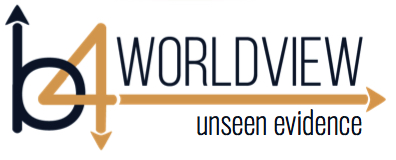
Key Thought for this session:
“Faith is the evidence I cannot observe for the truth that I must act on.”
Thank you for your answer and thank you for thinking about these things with me.
Generally, philosophy explains the abstract world through the eido knowledge we have of the physical world. Only then can we know that the abstract is true. You will hear this approach quite frequently. Much of the world accepts this as the way truth is determined.
This can feel confusing, but these ideas about knowledge, and how different experts view them, form defining core assumptions that come before our worldview ... and they shape what and how we learn. It would serve you well to work hard at seeing where your core assumptions come from because this does affect most everything you think, feel and do. So, let me try to help by illustrating a more comprehensive view through some simple examples of observable facts ... and unobservable facts ... in determining truth.
We can observe things like: the grass is green, Emily sings well, and that my heart rate after exercising is 150. But we cannot observe motivation, attitude, love, emotion. We can see that a wound has healed but we cannot observe healing. There are things that are true in our world that we cannot observe. We can only know they exist by observable outcomes associated with them, but we cannot see, feel, smell or touch an unobservable object. We know these are what they are, through faith or evidence that they exist, which comes to us in ways not attached to our physical senses. What are some of these providers of faith or unobservable evidence? Gnosis knowledge comes to us through intuition, conscience, thoughts and ideas that just seem to show up. We call this revelation.
So, some people, in contrast to popular philosophy, see that faith and science are really intertwined... working together in a process in us to reveal what we will accept as truth.
In this case eido knowledge supports gnosis, but it does not determine gnosis. You know in your heart what you know in your head and vice versa. In this core assumption, faith is an unobservable fact and, although often consistent with observable facts, FAITH provides the strength we need to trust what we believe to be true. When we have enough trust, we act.
The first approach to knowledge and faith appears to be more logical, inferring that faith is irrational... or that faith is NOT evidence of truth at all. The second approach claims that we must always trust something we cannot see because we can NEVER have 100% of the eido knowledge we need. Observable evidence is never 100% because so much of what is real in life is unseen, accessible only thru what our faith from our gnosis knowledge can tell our mind. We must have both seen and unseen (eido and gnosis) knowledge, backed by observable and unobservable evidence, in order to have knowledge that is credible enough for us to trust and act. Remember our discussion on trust. We must choose to be vulnerable to something and we can only be vulnerable when we believe it will be in our best interest. Trusting through faith is difficult because we become vulnerable to what we cannot see.
Our memory principle for this session fits well here:
“Faith is the evidence I cannot observe for the truth that I must act on.”
This statement catches some people off guard, because they have never thought of something like “faith” as being evidence. Here it is again:
“Faith is the evidence I cannot observe for the truth that I must act on.”
So, let me ask you: Even though faith is not based on physically observable evidence, have you ever thought of “faith” as legitimate evidence?